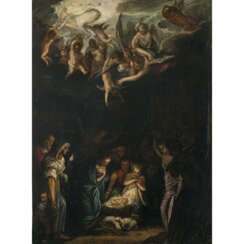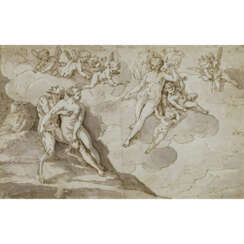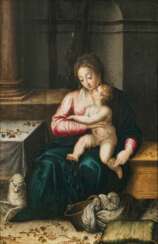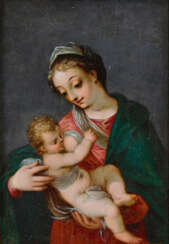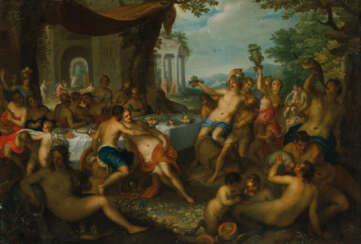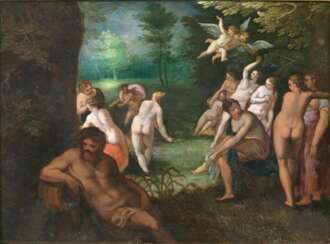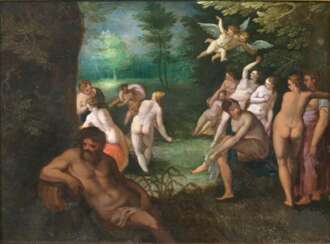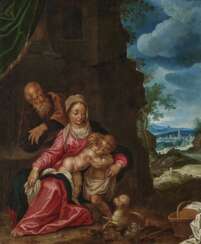Hans Rottenhammer (1564 - 1624) — Auction price
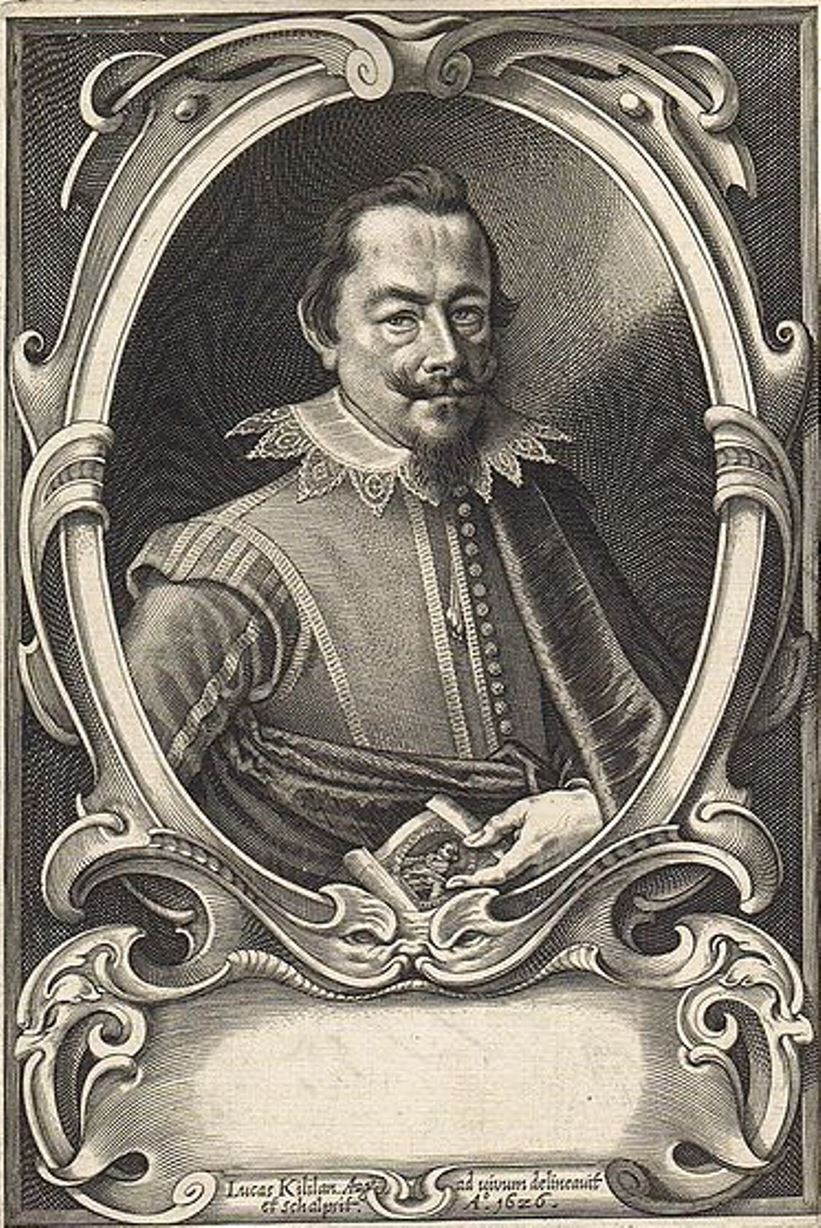
Hans Rottenhammer or Johannes Rottenhammer was a German painter and master of cabinet genre paintings.
After completing his studies as court painter to the Munich royal court, Rottenhammer spent nearly a decade in Venice, and his art bears the influence of Venetian masters such as Tintoretto and Veronese. Rottenhammer opened a studio in the city and attracted patrons and collectors as well as students and followers. In the early 1600s he joined the guild of Venetian artists. It was in Venice that Rottenhammer became famous for his cabinet paintings. These were small works, executed on copper and usually dealing with religious or mythological themes popular at the time.
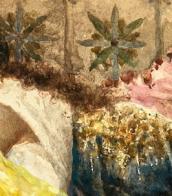

Hans Rottenhammer or Johannes Rottenhammer was a German painter and master of cabinet genre paintings.
After completing his studies as court painter to the Munich royal court, Rottenhammer spent nearly a decade in Venice, and his art bears the influence of Venetian masters such as Tintoretto and Veronese. Rottenhammer opened a studio in the city and attracted patrons and collectors as well as students and followers. In the early 1600s he joined the guild of Venetian artists. It was in Venice that Rottenhammer became famous for his cabinet paintings. These were small works, executed on copper and usually dealing with religious or mythological themes popular at the time.


Hans Rottenhammer or Johannes Rottenhammer was a German painter and master of cabinet genre paintings.
After completing his studies as court painter to the Munich royal court, Rottenhammer spent nearly a decade in Venice, and his art bears the influence of Venetian masters such as Tintoretto and Veronese. Rottenhammer opened a studio in the city and attracted patrons and collectors as well as students and followers. In the early 1600s he joined the guild of Venetian artists. It was in Venice that Rottenhammer became famous for his cabinet paintings. These were small works, executed on copper and usually dealing with religious or mythological themes popular at the time.
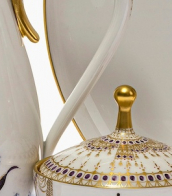

Hans Rottenhammer or Johannes Rottenhammer was a German painter and master of cabinet genre paintings.
After completing his studies as court painter to the Munich royal court, Rottenhammer spent nearly a decade in Venice, and his art bears the influence of Venetian masters such as Tintoretto and Veronese. Rottenhammer opened a studio in the city and attracted patrons and collectors as well as students and followers. In the early 1600s he joined the guild of Venetian artists. It was in Venice that Rottenhammer became famous for his cabinet paintings. These were small works, executed on copper and usually dealing with religious or mythological themes popular at the time.
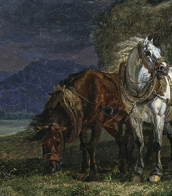

Hans Rottenhammer or Johannes Rottenhammer was a German painter and master of cabinet genre paintings.
After completing his studies as court painter to the Munich royal court, Rottenhammer spent nearly a decade in Venice, and his art bears the influence of Venetian masters such as Tintoretto and Veronese. Rottenhammer opened a studio in the city and attracted patrons and collectors as well as students and followers. In the early 1600s he joined the guild of Venetian artists. It was in Venice that Rottenhammer became famous for his cabinet paintings. These were small works, executed on copper and usually dealing with religious or mythological themes popular at the time.
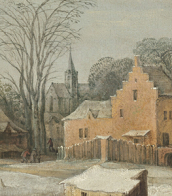

Hans Rottenhammer or Johannes Rottenhammer was a German painter and master of cabinet genre paintings.
After completing his studies as court painter to the Munich royal court, Rottenhammer spent nearly a decade in Venice, and his art bears the influence of Venetian masters such as Tintoretto and Veronese. Rottenhammer opened a studio in the city and attracted patrons and collectors as well as students and followers. In the early 1600s he joined the guild of Venetian artists. It was in Venice that Rottenhammer became famous for his cabinet paintings. These were small works, executed on copper and usually dealing with religious or mythological themes popular at the time.
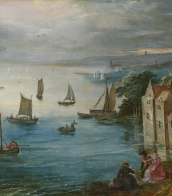

Hans Rottenhammer or Johannes Rottenhammer was a German painter and master of cabinet genre paintings.
After completing his studies as court painter to the Munich royal court, Rottenhammer spent nearly a decade in Venice, and his art bears the influence of Venetian masters such as Tintoretto and Veronese. Rottenhammer opened a studio in the city and attracted patrons and collectors as well as students and followers. In the early 1600s he joined the guild of Venetian artists. It was in Venice that Rottenhammer became famous for his cabinet paintings. These were small works, executed on copper and usually dealing with religious or mythological themes popular at the time.
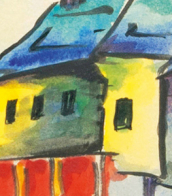

Hans Rottenhammer or Johannes Rottenhammer was a German painter and master of cabinet genre paintings.
After completing his studies as court painter to the Munich royal court, Rottenhammer spent nearly a decade in Venice, and his art bears the influence of Venetian masters such as Tintoretto and Veronese. Rottenhammer opened a studio in the city and attracted patrons and collectors as well as students and followers. In the early 1600s he joined the guild of Venetian artists. It was in Venice that Rottenhammer became famous for his cabinet paintings. These were small works, executed on copper and usually dealing with religious or mythological themes popular at the time.


Hans Rottenhammer or Johannes Rottenhammer was a German painter and master of cabinet genre paintings.
After completing his studies as court painter to the Munich royal court, Rottenhammer spent nearly a decade in Venice, and his art bears the influence of Venetian masters such as Tintoretto and Veronese. Rottenhammer opened a studio in the city and attracted patrons and collectors as well as students and followers. In the early 1600s he joined the guild of Venetian artists. It was in Venice that Rottenhammer became famous for his cabinet paintings. These were small works, executed on copper and usually dealing with religious or mythological themes popular at the time.

